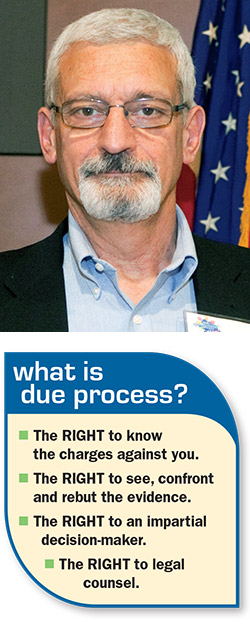 The student newspaper's final issue was stuffed into district office mailboxes. It was June 1992, and Frank Sinatra would have sung "It Was a Very Good Year."
The student newspaper's final issue was stuffed into district office mailboxes. It was June 1992, and Frank Sinatra would have sung "It Was a Very Good Year."
The following morning offered a much different tune.
Called into the principal's office, I was slapped with 3020-a charges that could get me fired. I was tenured, with 22 years as a teacher and faculty adviser for the student newspaper.
It started with a phone call from a board of education member who didn't like the political cartoon titled "Circus of Education" atop page 2 in the paper. It depicted board members and an administrator as animals surrounding a clownish ringmaster.
The principal tried to confiscate copies of the newspaper before they were mailed. The newspaper's editor- in-chief was threatened: Make this right or you won't receive a diploma. He ranked fourth in a class of more than 400, was a National Merit Finalist and was headed to Cornell to study law.
I stuck to my guns. I was determined to be a role model for the students, to stand up for journalistic principles. I insisted the newspapers not be destroyed and said we'd reprint pages before the papers were mailed to each student's household, substituting the cartoon with an innocuous exam schedule. We had advertisers' contracts to honor. We made the changes, but the 3020-a charges remained.
The 3020-a hearing featured three experienced administrators schooled in education law, with a presiding chairperson. The essence of the district's case: I failed to consult with the principal on a questionable topic. The 3020-a states that if I knew I was supposed to and didn't, I was insubordinate. If I didn't know to consult with him, I was incompetent. Seemed like a two-edged sword to me. Seemed like win-win for the district.
My astute NYSUT lawyer argued this wasn't a simple black-and-white case. The student editor had attended school board meetings for almost two years while double-dipping for his social studies Participation in Government class. The student newspaper echoed "the Wappingers Circus" idea from those posed by two local newspapers in 92 recent incidences on their front and editorial pages. We simply repeated what the grown-ups had said and what we had learned first-hand.
I had not checked with the principal. Guilty. I had instead checked with a reporter for the local newspaper, the college department head where I had attended many Journalism Days for editors and advisers, the Student Press Law Center in Washington, D.C., and with Bob Freeman, director of the Committee on Open Government, which is authorized by New York state to offer advisory opinions on the state's Freedom of Information Law. In other words, I consulted experts on the topic of free speech
Ultimately I was found not guilty by 2-1. The district appealed to the state education commissioner on the dissenting vote. Again, I was exonerated. Upholding my right to stand up and speak up for my profession and for my students defines tenure. Cherish its value.
I could have lost the final third of my teaching career if my due process rights weren't protected by tenure. The verdict restored me to my classroom and my journalism elective. Since then, I taught at least 1,500 more students about the power of the printed word, constitutional rights, canons of journalism and how to avoid censorship. I walked it, and I talked it.
I was, however, "disqualified" as faculty adviser to the school newspaper, but my loyal, local union asked if I'd edit our active teachers' newsletter. I've told their story as well as my own ever since.
Bill Dourdis is a member of the Wappingers Congress of Retired Teachers. He is editor of the award-winning WCRT newsletter, PostScript.